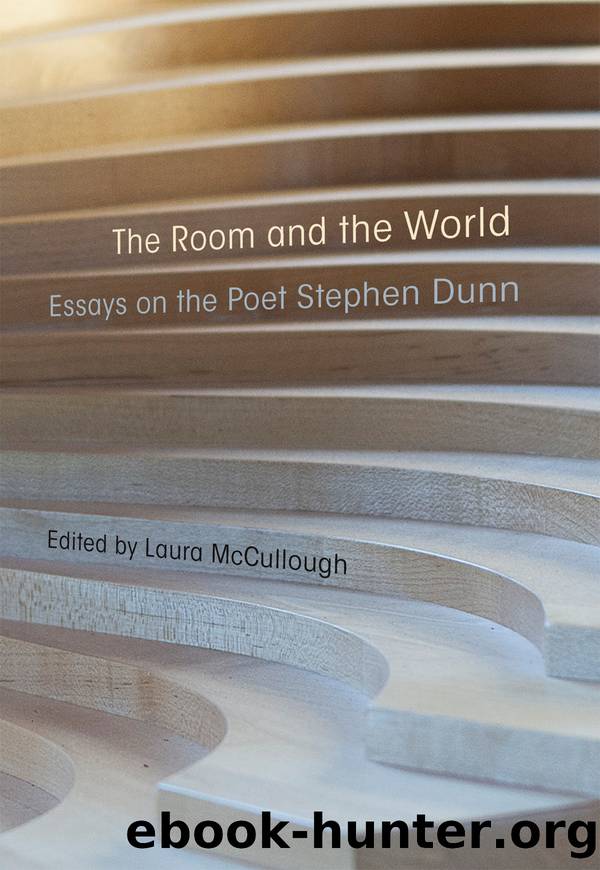The Room and the World by McCullough Laura;

Author:McCullough, Laura;
Language: eng
Format: epub
Publisher: Syracuse University Press
The Penumbra
Jason Schneiderman
It can be easy to think of Stephen Dunn as a sort of miniaturist in the Raymond Chandler mode, presenting, as one reviewer put it, a âregular guy cursed with an understanding of human nature more subtle than heâd preferâ (Brouwer 2009). Dunnâs self-consciously plainspoken style often allows him to play with the gap between what is being said and what is being communicated. Thereâs a wonderful moment in the poem âMercyâ that illustrates this technique: âMy wife whispered to me / This music is better than it soundsâ (WG, 180). In context, the wife is apologizing for the bad performance of a good score, but the gap is clear. This is funny because we recognize the speech act as the intended apology, but also a clear denial of reality. Dunn frequently creates ambiguity and dissonance in language that could not seem clearer or more natural, and I call this space âthe penumbra.â The penumbra is that excess meaning surrounding the dense flame of the straightforward and literal that drives his poems. Hovering in the margins of Dunnâs poems, especially the poems that deal with the men and women, are wonderful contradictions and undermining implications. Dunnâs poems are not simply the recordings of a sharp observer but observations that sharp observers will call into question. It often seems like Dunnâs speaker has said all there is to say, but there is a huge amount of work remaining for the careful reader.
The poem âWhat Goes Onâ is the title poem of Dunnâs second volume of collected poems. At first it seems to tell an unpleasant story of an unpleasant marriage. The wife cheats, leaves her husband, and ends up alone. She gets cancer, the treatments become debilitating, and her husband asks her to return. They live what seems to be a marriage blanc. The husband gets back the wife he never stopped wanting; the wife is cared for in her weakness.
The poem has a plural narrator, a âweâ that speaks about the marriage as it is observed from the outside. What is interesting here, what goes on in what I am calling the penumbra, is that the community is not distressed by divorce but by caretaking without passion. A divorce makes perfect sense to the community, and it is narrated as a more or less familiar situation. Similarly, to care for a lover who is ill or dying would be familiar territory. But the combination of the twoâthe end of passion followed by the tenderness of caretakingâis distressing and tender and poignant at the same time. Two-thirds of the way into the poem, we are told that âeach of them called it love,â but the narrator both undermines this assertion and highlights the pathos: âbecause precision didnât matter anymoreâ (ibid., 86).
This is clearly a poem about love, and yet this form of love is a deep threat to the community that watches this couple, a community that has no words for what they want to name this relationship. In
Download
This site does not store any files on its server. We only index and link to content provided by other sites. Please contact the content providers to delete copyright contents if any and email us, we'll remove relevant links or contents immediately.
The Power of Myth by Joseph Campbell & Bill Moyers(926)
Half Moon Bay by Jonathan Kellerman & Jesse Kellerman(914)
A Social History of the Media by Peter Burke & Peter Burke(885)
Inseparable by Emma Donoghue(848)
The Nets of Modernism: Henry James, Virginia Woolf, James Joyce, and Sigmund Freud by Maud Ellmann(752)
The Spike by Mark Humphries;(726)
A Theory of Narrative Drawing by Simon Grennan(710)
The Complete Correspondence 1928-1940 by Theodor W. Adorno & Walter Benjamin(707)
Ideology by Eagleton Terry;(663)
Bodies from the Library 3 by Tony Medawar(652)
World Philology by(647)
Culture by Terry Eagleton(646)
Farnsworth's Classical English Rhetoric by Ward Farnsworth(644)
A Reader’s Companion to J. D. Salinger’s The Catcher in the Rye by Peter Beidler(614)
Adam Smith by Jonathan Conlin(610)
High Albania by M. Edith Durham(594)
Game of Thrones and Philosophy by William Irwin(592)
Comic Genius: Portraits of Funny People by(585)
Monkey King by Wu Cheng'en(579)
